- Home
- Jimmy Guieu
Polarian-Denebian War 4: Space Commandos Page 2
Polarian-Denebian War 4: Space Commandos Read online
Page 2
“When the giant saw us our Onka detector showed its heart rate jump from 75 to 95, then to 100 instantly!”
“Put yourself in their place. Seeing an inexplicable and frightening ‘vision’—like our appearance—is a rude awakening. We can’t lose sight of the fact that these beings are like giants to us, so we must look like dwarves to them. When they see us, many of them are first wondering if they can believe their eyes. And then when they tell their ‘unbelievable’ stories to the other natives, they’re considered crazy or frauds. Since they can’t travel in space from one solar system to another they don’t know about or refuse to accept the existence of other beings living on countless planets in the galaxy. It’s hard for them to imagine that they’re not the only intelligent beings in the cosmos. So, the creature we just scared and paralyzed will have a lot of trouble convincing others of the truth about the adventure. Only a few inhabitants on T27 with a more evolved mind will admit that he really did experience this ‘strange encounter’. For the others, the vast majority unfortunately, he’ll be out of his mind or playing a bad joke.”
Injya shook her head and sighed. “These Earthlings are really a stupid and backward race!”
The spaceship of Hogounn and Injya slowed down. On the black background speckled with bright stars, far beyond the atmosphere, it took two hours for the huge astrobase to make the complete orbit of planet T27, the galactic name for planet Earth.
The disc-shaped reconnaissance ship approached the base—an extraordinary spherical ship over a mile and a half in diameter—and slowly entered the huge hatch that was 165 feet wide and long and closing up behind it.
The spaceship (20 feet in diameter and 5 feet high on its axis), a tiny orange chip compared to the formidable observation base, landed on its round platform at the end of the first row of other similar machines. In the huge “garage” of the artificial satellite, in tight rows were lined up almost 500 Fimn’has, the disc-shaped reconnaissance ships that the inhabitants of T27 persisted in calling “Flying Saucers.”
Around every ten minutes one or more of these Fimn’has took off for Earth. Others, at pretty much the same rhythm, came back to the base after a mission to film the cities and industrial centers or perhaps a “quick experiment of contact with the natives.”
Hogounn and Injya sat in a kind of metal cube that started sliding over the shiny floor then gradually rose up to around eight inches off the ground. The cube went around the impressive squad of spaceships, climbed up a ramp and jumped into a circular opening, a kind of well with bright walls where it sped up. Over a mile up the cube entered one of the many openings along the tube that linked the two “poles” and moved down a 12-foot wide, 20-foot high corridor that wound around the axis of the artificial satellite.
The space station had 117 floors that included the air-conditioned living spaces, various laboratories, observatories, stock rooms and numerous centers of scientific research. Four special sections, two at the top and two at the bottom, served as astrodromes able to hold up to 500 spaceships depending on their size and function.
Every floor, with pressure and air system adapted to the physiological requirements of the occupants, had several corridors in addition to one big, inner corridor that had no atmosphere where the different types of living beings on the base had to move about in the spacesuits fitting their biological category.
The inhabitants of the astrobase, to get from one floor or section to another, could use either the gravito-magnetic tubes and corridors or simply the two- and four-seater cubes. These vehicles, by varying (sometimes totally eliminating) the strength of the artificial gravity of the satellite, moved every which way with extraordinary ease thanks to their electromagnetic propulsive field.
The cube in which Hogounn and Injya were sitting stopped in front of a big hatch. The two astronauts jumped onto the metal floor and straightway the strange, wheel-less vehicle rose up to the ceiling and sped off in the opposite direction.
The hatch opened and the two “visitors” entered a huge, triangular room in the middle of which, sitting behind a kind of desk, waited someone quite different from the two astronauts. The latter were around three feet tall, their skin orange and their delicate hands each had six fingers, but the being awaiting them, on the contrary, was taller at almost four feet and its skinny arms ended in a kind of hand with four opposable fingers. In his black face were huge, oval, extremely movable eyes that jutted out rather creepily. On his cheeks and chin clumps of long hair grew straight and rigid, very thick, all the way down to his bare chest that was covered with long, blackish fuzz.
His nose was stuck in a capsule with two flexible tubes that hooked up to an air tank strapped to his back. Just as the regulations of the base demanded, although the chief of the base belonged to a different race than his visitors and therefore did not breathe the same air, he had to adapt his inhaler. After emptying the air from his office and replacing it with an artificial atmosphere fitting for his visitors, they could then be welcomed and make their report without needing to wear their bulky spacesuits.
Hogounn and Injya bowed to Fohag, the base chief, and rattled off their identities, “Hogounn and Injya, numbers AL-279 and AL-3017, originally from the planet Alkar in the Valnyk solar system,” Hogounn said. “Hello, Fohag!”
Fohag spun his bulging pink eyes in their sockets to glance at them as he watched the spaceships moving on a video wall map. Then in a familiar gesture he raised the four fingers of his left hand to his right shoulder and broke the silence by using the universal language of the Federated Worlds.
“Hello, Centaurians.”
Fohag paused and his pink eyes turned blue, which on his planet meant he was smiling.
“I call you Centaurians because that’s how the Earthlings would call you if they knew about your existence. Valnyk, your sun, is for them the star Alpha in the constellation Centaurus. I make this brief digression because I know that after your mission you’re going to ask again to teach you one or more languages spoken on T27. Right now I can only give you a few words, like the Earth name for Valnyk, for example.”
One of his big eyes stared at the animated star chart while the other concentrated his attention on his two visitors.
“I’m listening, Centaurians.”
When they had told him of their expedition down to the slightest detail, Fohag declared, “You were careless in landing your Fimn’has on what you figured was an unused road. We haven’t been exploring this planet from the air for eight years just so you could take a stroll. Hundreds of thousands of films have been taken on all the continents. Today we have a topographical map of this world more precise than its own inhabitants possess. These maps are at your disposal. If you’d carefully studied the map of the region you were in, you would have seen that what you took for a path was, in fact, what the Earthlings call a ‘railroad’.”
“Railroad?” Hogounn and Injya echoed, embarrassed for committing a tactical error.
“It means a special road with twin metal runners sticking up that guide a heavy steam engine, sometimes electric, to transport natives, animals and all kinds of material. If such a vehicle had hit you during your landing, despite the ship’s unbelievable strength in Earthling terms, vital elements could have been damaged. Staying faithful to our principles of non-violence when violence is not an issue, you would not have been punished. However, from now on I insist that you follow the rules of landing to the letter.”
“We will follow them, Fohag, and thank you for your leniency,” Hogounn promised, disturbed by this incident.
Any witness to this interview would be surprised by the logic and ethics that was so different, if not paradoxical to the human mind.
Hogounn handed the Chief a kind of pyramid with notched edges. Through the notches was wound a magnetic thread on which the different sounds they heard during their mission were recorded.
Fohag took the pyramidal spool in his three long fingers and slipped it pointing downward into a rectangula
r opening on his half-moon desk. He pressed the bottom of the small spool and they heard a click. The magnetic thread was starting to feed into the “reading head” of the machine that was built into the strange metal furniture with levers, buttons, dials and screens all over its top.
Hogounn and Injya listened carefully. Over the background speakers came the thousands of sounds that they had heard during their visit to T27. First there was the muffled stomp of their boots on the railroad ties, the rustling of the wind in the vegetation along the path and then the first growls of the small, four-legged creature that was soon barking furiously. After a silence, disturbed only by the yelping of the scared dog, the barking started up again, sometimes cut with oddly pitched howls. Finally came the entrance of the primitive “giant”, the Earthling, intrigued by the unusual behavior of his dog.
Hogounn and Injya paid close attention to the polyphonic jumble that they did not understand. Only Fohag, being Chief of the base, had received instruction in the main terrestrial languages and could understand the meaning of this weird recording.
The ambient stereo produced the clear and distinct voice of the Earthling speaking to his dog: Come on, Kiki, be quiet! Here the sound of his hand petting the dog affectionately. What’s going on? Yapping followed by howling, then fading away. Holy shit! Barking that faded and scratching on the pavement when it scampered away while its master stood paralyzed.
The two Centaurian astronauts were amused to relive the episode of their routine landing on planet Earth.
“Is the recording… interesting?” Injya was still hoping that the Chief would decide one of these days to give them a few translations of their many recordings.
“Well… yes, interesting enough. When the Earthling saw your Fimn’has so close to his habitation he said something that I don’t understand… I’m going to make a semantic analysis immediately with the help of the comparative-translator to get the exact meaning of the word. You can go now, Centaurians. Even though your missions seem boring and eternally repetitive to you, they are nonetheless very useful because they bring us some new knowledge every time. Go, brother Centaurians. You have ten sfang of rest. Spend the time however you want and come back when it’s over.”
When the two Centaurian troopers of the Space Commandos assigned to this solar system had walked out to enjoy their “leave”, Fohag got to work on searching for the meaning of the new word. For this he isolated the word in question and ran it several times through the “reader”. He listened carefully until it became monotonous and then passed it into the electronic comparative-translator.
With his long fingers bent back, which neither the Centaurians nor humans could do, Fohag reflected on the weird sound of the incomprehensible word while waiting for the machine to give him a translation.
After a relatively short time he heard a click and in the galactic language of the Federated Worlds the speaker pronounced in a monotone the various comparative ideas that the word evoked under its multiple forms in the seven primary languages spoken on T27.
After listening to the voice of the electronic brain that controlled the translator, Fohag shivered. His eyes went from pink to green, thus betraying his outrage and confusion caused by the translation of this… “perfectly English” word!
“Really, these Earthlings are not only primitive but very crude!” the Chief of the astrobase concluded.
His Wolfian sensibility (for, he was originally from the planet Mongan in the Wolf 359 solar system according to Earth’s astronomical nomenclature) was deeply shocked.
CHAPTER II
A period equal to four earth days went by during which the disc-shaped Fimn’has made many observations on planet T27.
Fohag, Chief of the astrobase, had just summoned the members of the Space Commandos to a meeting. In the huge room, a kind of amphitheater shaped to the outer curve of the satellite, were gathered 300 astronauts mostly belonging to the Centaurian race from the planet Alkar. On the hollow seats arranged in a semi-circle there were also some Wolfians, bigger than the Centaurians and covered in their strange, black fur. Their big, round eyes were in constant motion.
On a gray metal stage, behind a kind of long, slanted desk with a chrome top covered with switches and buttons and dials with as many blinking lights, sat Fohag, the section chiefs and the officers of the astrobase. To an Earthling this assembly would have looked like a “Freak Show” or better like a vision out some hideous nightmare. In fact, on the stage with the section chiefs, besides Fohag there were two, 3-foot tall Centaurians wearing transparent spacesuits that revealed their almost human morphology, in spite of their small stature, orange skin and six fingers. Then came the two Wolfians, four feet high, wearing like Fohag a dark blue metal spacesuit with a round helmet fitted with a rectangular opening in transparent xoning. To Fohag’s right, finally, were three Polarians, also in spacesuits that hugged their powerful muscles. These three, for sure, would have astonished an unwitting Earthling witness to this meeting because they were identical to “primitive” humans on the planet Earth. The only difference between them was in the fact that besides their extraordinary scientific knowledge (inherent to their supra-evolved civilization) they had four extra senses: telepathy, paroptic vision, poly-perception or the ability to follow different currents of thoughts simultaneously and finally the ability to paralyze or even kill at a distance by the simple projection of an electrocuting current somewhat like the gymnotus2.
These Homo Superior, through the spectacular antiquity of their race and the no less spectacular technical abilities, had peacefully colonized countless solar systems spread throughout the Galaxy. Called “Grand Instructors,” boundlessly good and understanding for the under-evolved or primitive races that they had educated and protected against all attempts at brutal colonization—in fact, against the slavery to which certain warlike civilizations had tried to subject them—the Polarians were particularly beloved masters of no matter who they were protecting. However, their kindness and wisdom did not keep them from acting with merciless strictness against the races who remained hostile or deaf to their peaceful missions. There exist in the galaxy beings with visions of power trying to enslave the planets of certain solar systems that have not yet reached the evolutionary stage to defend themselves with equal arms against such tyranny.
The interstellar wars and the unbelievable disasters that followed were things that an Earthling could not even imagine. His reason would systematically refuse to consider for one second what he considered “a figment of the imagination”, even a delusional fantasy worthy of some scatterbrained science fiction story!
The truth, however, was there only 400 and 600 miles away, the distance separating the two astrobases of planet Earth. These two artificial satellites were the “outposts” of the Space Commandos sent to this solar system by the Galactic Federation of the United Worlds. The goal of these “beings from space” was to study the Earthlings in detail before making official contact with them. For, official contact was soon going to be necessary because the Space Commandos had more than once spotted and intercepted reconnaissance patrols launched by the Denebians, the green, scaly-skinned monsters from the solar system Deneb in the constellation Cygnus. These pirates of the Galaxy and their allies from Procyon, driven by their desire for conquest, were seeking planets to colonize.
Twice already the Polarians had driven the Denebians away when they tried to set up a base in a deserted region on Earth and on its moon.3
In astrobase 2 orbiting 600 miles from Earth, the meeting of the various representatives of the Federated Worlds had two goals: to inform the participants about the latest observation missions on the ground and to decide on the nature of future peaceful forays.
Fohag stood up and in a position familiar to the Wolfians he curved back his arms so that his four long fingers touched his shoulders. Then, using the universal language of the Galactic Federation he said:
“Eight years ago, according to the measure of time used on T27, when
our space exploration squads were drawn by the first atomic explosions that occurred on Earth, we were pleased at first. We’re well familiar with this old planet that we visited at the dawn of its civilization when it was only inhabited by beings still close to their animal nature. Over the course of many millennia we followed the development of the different civilizations that succeeded one another.4 We abandoned it to its fate when the inhabitants, still hardly evolved, were searching for their way, groping along paths of knowledge, a little before the arrival of the one the Earthlings call the Son of God, the greatest Initiate that the planet Earth ever saw. After this coming, which shook up the peoples of this world, we were happy just watching from afar the first stages of the reborn civilization. Because after the cosmic cataclysm that buried Atlantis—the last supra-evolved civilization to receive the teaching of the human-like Polarians—Knowledge had been almost completely lost.
“Now, therefore, when our space squads saw their hypersensitive detectors recorded an atomic explosion on T27, the Polarian officers felt great joy. In their great wisdom they thought that the Earthlings had finally discovered the primordial energy and after domesticating it were using it for industrial purposes, like razing land, drilling the ground to build giant reservoirs, breaking up mountain chains to modify the climate or other profitable uses.
“Alas, although men had discovered the power of nuclear fission, they did not use it for a beneficial end. No. They had domesticated the primordial energy in order to build a powerful weapon: the atomic bomb! Here we don’t have to know the reasons that pushed one side to bomb the other. Moreover, staying faithful to our politics of non-intervention in the internal affairs of an under-evolved world when the safety of its civilizations is not at stake, we couldn’t intervene. So far such was the case with the wars that have been waged between men. These wars, in any case, had not destroyed Life on Earth. However, with nuclear energy it was no longer the slaughter of hundreds of thousands of men we feared but the extinction of Life on this planet. For, from the atomic bomb to the hydrogen bomb was a small step that the Earthlings took in only a few years. The H-bomb is more powerful than its younger sister and more dangerous with its fallout. From the hydrogen bomb to the cobalt bomb is only one more step… relatively easy to take. If men take this unfortunate step and start a war in which one side or the other uses cobalt bombs, it’ll be the end of Life on Earth. Its atmosphere will be completely polluted by the radioactive gas and destroy everything up to the tiniest spores and microorganisms. Human civilization will survive only as ruins that will quickly crumble into radioactive dust.

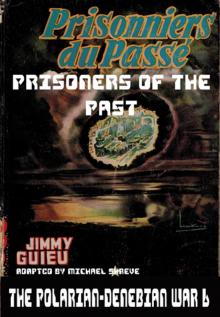 Polarian-Denebian War 6: Prisoners of the Past
Polarian-Denebian War 6: Prisoners of the Past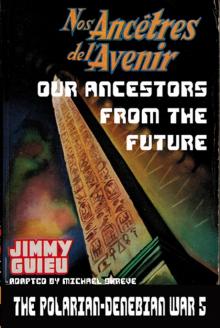 Polarian-Denebian War 5: Our Ancestors From the Future
Polarian-Denebian War 5: Our Ancestors From the Future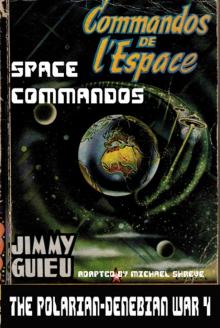 Polarian-Denebian War 4: Space Commandos
Polarian-Denebian War 4: Space Commandos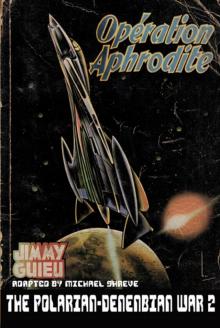 Polarian-Denebian War 2: Operation Aphrodite
Polarian-Denebian War 2: Operation Aphrodite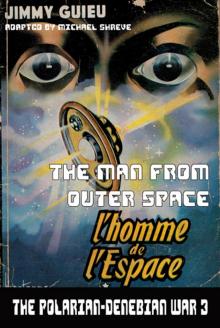 Polarian-Denebian War 3: The Man From Outer Space
Polarian-Denebian War 3: The Man From Outer Space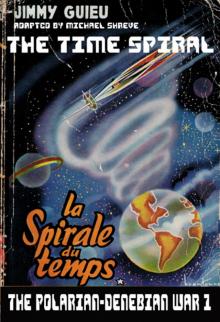 Polarian-Denebian War 1: The Time Spiral
Polarian-Denebian War 1: The Time Spiral